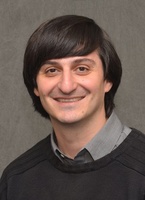 Artur Indzhykulian, MD, PhD, an Assistant Professor of Otolaryngology–Head and Neck Surgery (OHNS) at Harvard Medical School, has been awarded a five-year, $3.7 million R01 grant from the National Institutes of Health (NIH) to launch a multi-center collaborative study on a new type of gene therapy for treating Usher syndrome type 1F, a rare – albeit debilitating – form of Usher syndrome.
Artur Indzhykulian, MD, PhD, an Assistant Professor of Otolaryngology–Head and Neck Surgery (OHNS) at Harvard Medical School, has been awarded a five-year, $3.7 million R01 grant from the National Institutes of Health (NIH) to launch a multi-center collaborative study on a new type of gene therapy for treating Usher syndrome type 1F, a rare – albeit debilitating – form of Usher syndrome.
R01 grants are the oldest type of research grant distributed by the NIH. Under his awarded grant, Dr. Indzhykulian will serve as the lead principal investigator (PI), and David P. Corey, PhD, Bertarelli Professor of Translational Medical Science at Harvard Medical School, and Marcos Sotomayor, PhD, Associate Professor in the Department of Chemistry and Biochemistry at The Ohio State University, will serve as multi-PIs through the NIH’s novel multi-PI grant mechanism.
Usher syndrome type 1F is a hereditary disease that occurs from a mutation to a single gene, PCDH15. The mutation results in profound deafness and lack of balance at birth and blindness that progresses over time. In recent years, standard gene therapies have successfully treated mutated genes using adeno-associated virus (AAV) vectors. Healthy versions of the gene are packaged inside the AAVs, which travel to cells with mutated genes. The coding sequence of the healthy gene then augments the cell to correct the adverse effects of the mutation.
Unfortunately, PCDH15 is too large to fit inside a standard AAV. So, instead of trying to transport a full-sized version of the gene, Dr. Indzhykulian and his colleagues have engineered miniature PCDH15 genes that fit inside an AAV and produce miniature, albeit effective, variations of the proteins needed to rescue hearing and balance.
Funding from the R01 grant will allow Drs. Indzhykulian, Corey and Sotomayor to carry out preclinical evaluation of this novel therapy. Together, they will test the effectiveness of the miniature proteins to restore sensory function in mice missing a Pcdh15 gene and test the toxicity of the proteins in non-human primates. If successful, these miniature gene constructs could pave the path to a clinical trial.
